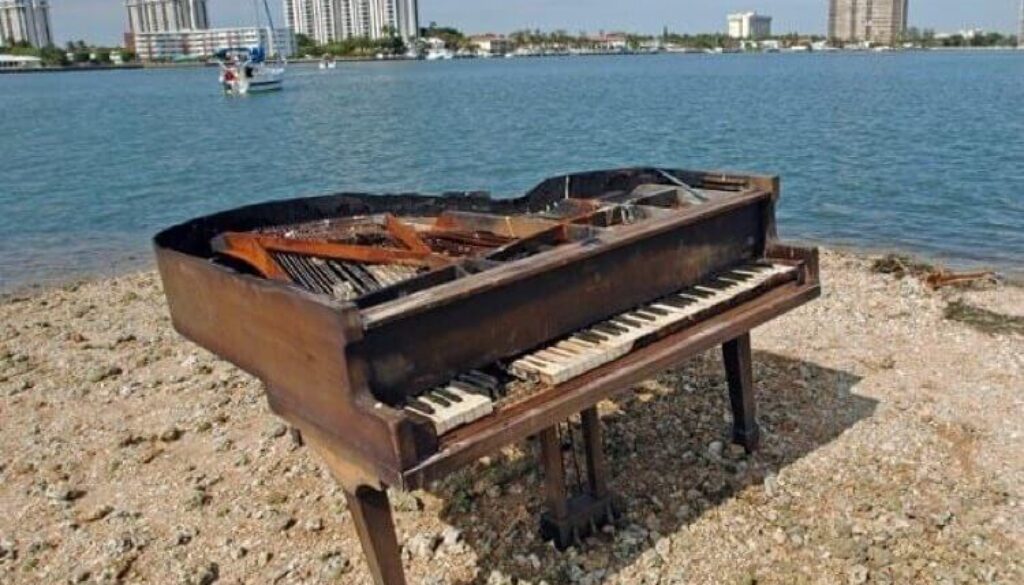How To Take Care Of Your Piano
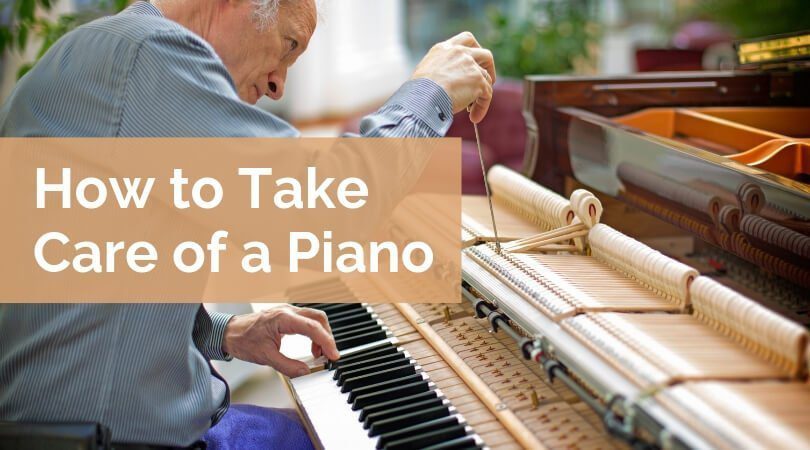
A luxury piano not only promises a lifetime of enjoyment both musically and as an art object, but is an investment that warrants care and maintenance to assure its outstanding performance over the years. There are factors that should be considered when owning a fine instrument, and different pianos have somewhat different needs.
All Pianos Need Skilled Technical Maintenance
Most people know that a piano requires periodic tuning. Tuning is the simplified catch phrase for what a skilled technician actually does “under the lid” on behalf of the intricate system inside your piano. Most piano makers recommend servicing an expensive piano at least two times a year up to four times a year, depending on its use, and it’s especially important in the first year of a piano’s life in order to adjust to the humidity of a new location. To ensure the warranty and maintain the instrument’s value, qualified service is a must.
The three components of a piano’s performance service needs are tone, touch, and pitch. The technical adjustments that the technician applies on a given service call are based on the age, location, use and condition of the instrument.
Tone
Tone changes with wear on the felt hammer heads so periodic “voicing “of the hammers is necessary for a full, even tone. This is not a necessity in a new instrument and not part of the regular “tuning.” But pianists will recognize when the tone of their instrument is not producing the widest possible dynamic range, and an expert technician can restore the initial state of the hammer head felts and provide voicing services when needed. Voicing is an art mastered by specialists and should not be entrusted to just any piano tuner.
Touch
Touch is maintained by “regulation” service, which is the adjustment of the action and keyboard assemblies. The sophisticated actions of modern grand pianos and contemporary upright pianos give optimum results when the irregularities of the keyboard and action assembly are attended on a timely basis. Every qualified technician will re-adjust the action on each service call or let you know when such measures are necessary.
Pitch
Pitch is corrected by good piano tuning. The strings of a piano must be of a proper tension, i.e. pitch, in order to have the correct sounding, musical intervals. Changes in climate, location, and amount of use or disuse can affect the tension of the strings and throw a piano out of tune. Superior pianos hold their pitch. Mass produce, inexpensive pianos usually require more maintenance. As an example, most new pianos need tuning when they reach the store of the dealer. Depending on the frequency of use and choice of literature, a piano might need frequent tunings, as in the case of a professional concert grand piano which is tuned prior to every performance.
Regardless of how much you play your piano or how often you service it, you should only entrust a valuable asset to qualified technicians. In the wrong hands, the delicate workings of pianos can be severely and permanently damaged. Just as you probably wouldn’t drop your Ferrari automobile off at JiffyLube, you don’t want to be careless with maintenance personnel for your high-end piano.
What Determines The Need For Piano Maintenance?
Piano Moving and Transport is no small matter. Even within a person’s own home, a professional piano mover can save the owner a lot of grief. Pianos are bulky and heavy, even when they are on casters. At the same time they are delicate and intricate mechanized instruments and not merely pieces of furniture. Moving a piano yourself can wreck your own floors, and do permanent damage to an expensive instrument. The legs of a piano can be severely damaged without proper lifting and pressure techniques. Professional piano movers are worth their (usually) high prices in order to preserve your precious investment. Moving a piano is usually enough to disrupt the pitch and action and necessitate skilled maintenance on the instrument. Moving it without professional piano movers is usually enough to cause serious damage. Do not be fooled into thinking that standard furniture/household movers are a solution. Piano moving is a specialized skill.
Piano movers have specialized experience, equipment and should carry insurance. Damages caused by moving a piano are not covered by factory warranties. When hiring a mover, you must communicate accurate information about the building, freight elevators, number of floors and stairs, stair landing size and rotation angles, etc. for both pickup and delivery.
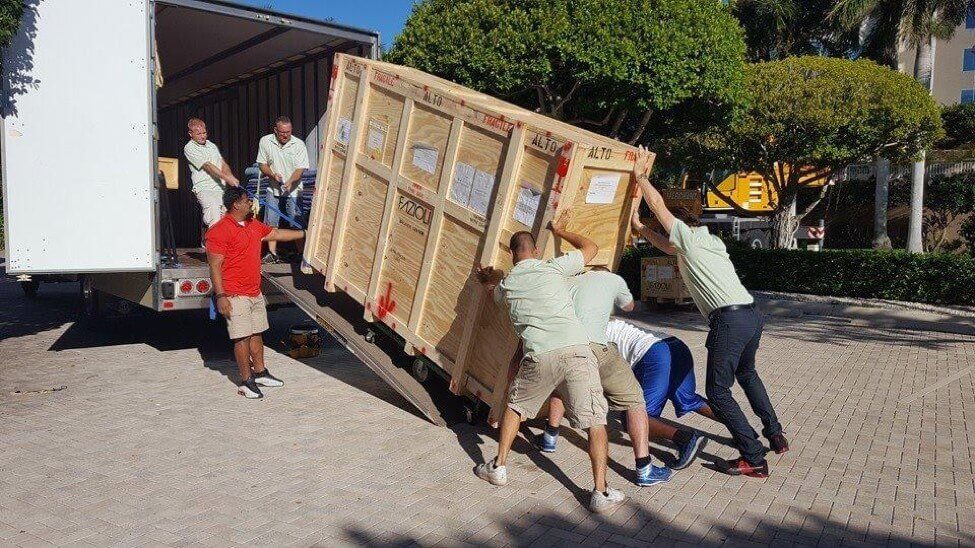
Access permissions to gated communities and high-rise condominiums must be secured and guaranteed for the movers. Make sure the climate is controlled in the truck for long journeys or in the storage place if delivery is delayed or storage is required. Extremes in temperature can be very detrimental to an instrument. Never store a piano in a warehouse or space that is not climate controlled.
It is for all these reasons that used pianos are such a risky undertaking. A buyer never knows where that piano has been, how it’s been moved or treated, and if it has or has not sustained internal damage that cannot be repaired.
Indoor Climate and Humidity is an important consideration for your piano and will affect not only the frequency of maintenance, but the ongoing health of your prized instrument. Many parts of the piano are made using fine and sometime rare woods for pinblocks, soundboards, hammers and outer cases—and the temperature of a room can affect such materials.
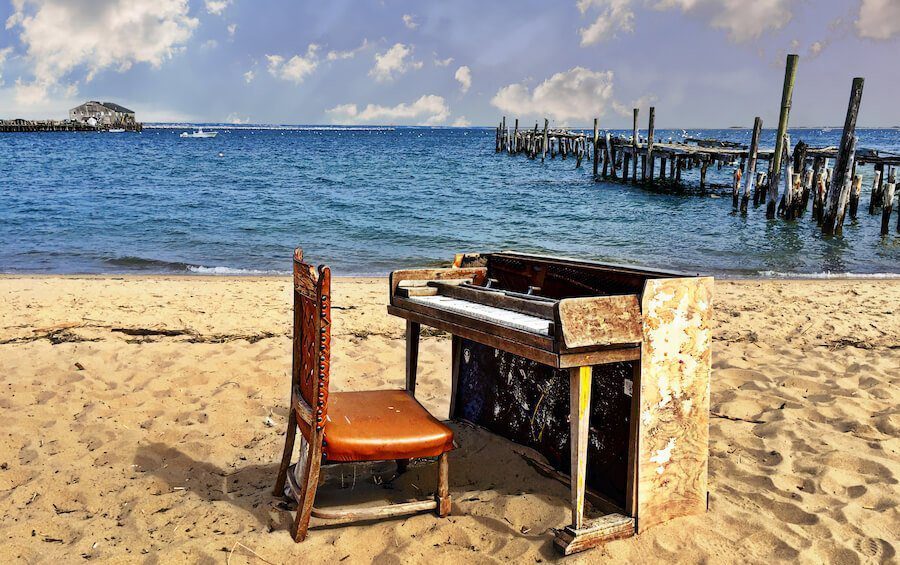
Needless to say, a piano should never be permanently placed in an outside locale, even in Florida where there’s no concern for snow. The humidity alone would do irreparable damage.
Variations in temperatures, from extreme heat to extreme cold, can do damage to the organic and sensitive working parts. Woods are sensitive to change, so at high humidity, tuning suffers; natural materials such as felt, wood and leather swell, and high humidity can wreak havoc on the keyboard and action assembly. On the other hand, extreme dryness can be just as dangerous. If the humidity goes below 35 percent, water should be added to the climate of the room. Ideally you should have a thermometer and humidity meter in place, with 40 to 50% humidity and an approximate temp of 70 degrees as a rule of thumb.
Piano Placement in the Room may not sound like it would affect the care and maintenance of your instrument, but the location not only dictates how sound is optimally delivered (radiated into the space) but how maintenance can be affected as well. When you purchase a piano from an experienced source, you should be able to consult with them about the ideal placement for acoustical resonance, and avoiding dangers.
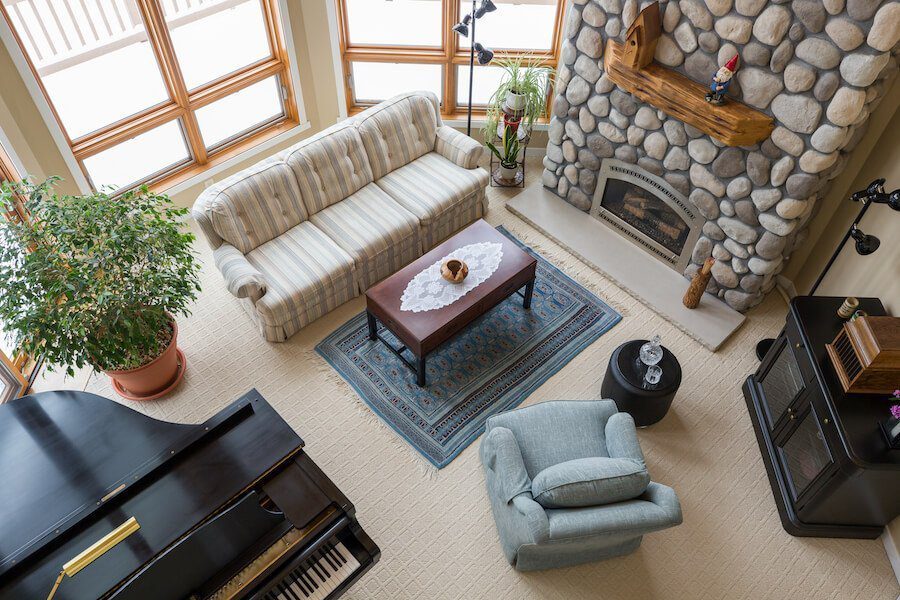
You would not place a piano over or near heat and cold sources which could dry wood, cause cracks and affect the tuning stability. Bright direct sunlight, open patio doors, traffic patterns, clutter and other factors should be taken into consideration in placement.
How to Clean a Piano
Piano Case Cleaning and Care helps the long-term value of your asset. Dusting lightly and piano polish is recommended. Fingerprints can be removed with a damp chamois. Special veneers usually have recommendations from the manufacturer for special products, but care is needed about applying too much pressure, never rubbing satin surfaces too strongly. Avoid using water on the case, and avoid allowing any kind of drinks or food to be placed the piano.
Do not use abrasives or any kind of aggressive cleaning agents. If you have a major mess on your hands, contact a reputable piano consultant or technician to give you advice.
Most importantly, any kind of “cleaning” needed under the lid should only be handled by an expert.
So, What About The Care And Maintenance Of A Glass Piano?
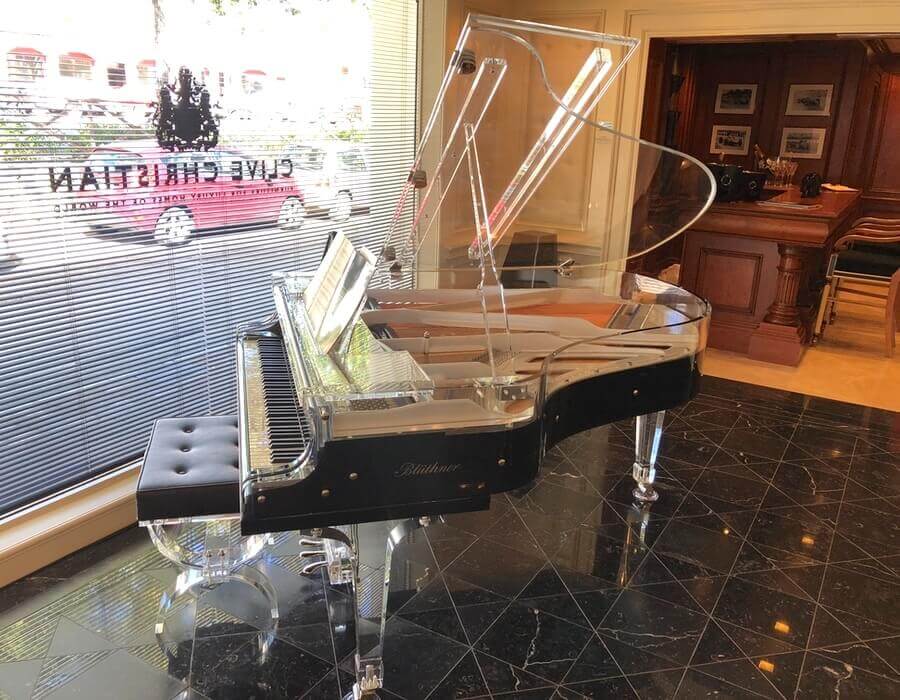
The beautiful new transparent pianos which reveal what’s under the lid may not have as much wood on the outside, but they still have organic materials within. The tone, touch and pitch maintenance is the same as any piano, although in the crystal grand piano, you can be assured that you have bought the most stable and reliable of luxury pianos, much more likely to hold pitch longer, given that cheap pianos always require more upkeep.
Plexiglas acrylic remains crystal clear without distortion no matter the thickness of shape. It’s scratch resistant with a perfect smooth, shiny surface so dirt can barely adhere and the surface repels water. These properties last a lifetime. The nicest maintenance perk is that the exterior care of these beauties consists of little more than normal wipe-cleaning with water and a damp cloth to keep it looking new. Normal small scratches that might occur on acrylic can be cured with a special cleanser or acrylic polish. Severe scoring or gouging can be sanded and refinished.
The airy lightness of the glass pianos often make its placement in a room a less difficult decision because it doesn’t ‘hold down the floor’ like some 800 lb. black concert grands.
Another perk of the glass pianos is that the case is not as sensitive to direct sunlight and staining.
But regardless of the case, the buyer should always be aware that it’s the inside of the case where the precious cargo is carried—so regular care and maintenance is not to be ignored.
ABOUT EURO PIANOS NAPLES
Euro Piano Naples, a world-renowned distributor of European designer pianos, has company origins dating back to 1965. Its innovative online boutique, caters to designers and consumers seeking the best, and offers the zenith of luxury instruments, including its own newly designed acrylic piano, The Aire. Based in Naples, Florida, Euro Pianos Naples is a community leader actively engaged in artistic and commercial affairs, sponsoring a series of grand piano concerts featuring world class pianists.

